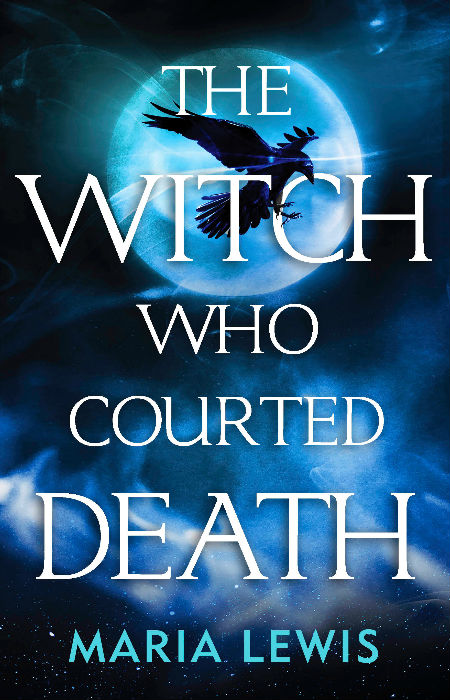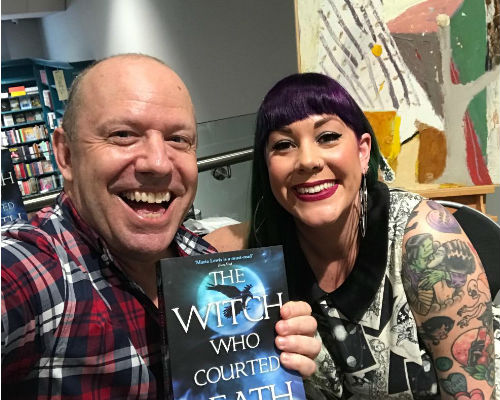
Diving into a book by Australian author Maria Lewis is a guarantee that you will be plunged, with well-researched vigour, emotional resonance and palpable love and familiarity with the supernatural, into a world vary different from the everyday world we encounter.
Each of her books to date, which incorporate magical realism, or fantastical elements into the “real” world, including Who’s Afraid?, Who’s Afraid Too? and It Came From the Deep have taken readers on extraordinary journeys, not only across place and time but far into the heart of her characters who aren’t simply tropes designed to serve the greater narrative good.
Take the exquisitely-wonderfully named protagonist of The Witch Who Courted Death (the title drawn from the interactions between the lead character and a witch who enjoy a gloriously-complicated relationship), Korvossier von Klitzing, a German medium who since childhood, along with her brother archly-flamboyant twin brother Barastin, has been able to not simply see and communicate with the dead, but enter their realm and usher them off to their final eternal resting places.
Within the first chapter and then quickly beyond with an elegance and sense of fun that offers plenty of information about the characters and the world they inhabit without info-dumping readers to death – a salient topic given Korvossier’s stock in trade – it is quickly established that the protagonist is a complex, layered woman who presents a hard exterior to the world, and the ghosts with whom she habitually deals (work which pays handsomely by the way) but who has a conflicted, isolated heart beating beneath.
“The dead were everywhere, usually moving unnoticed through the world as they followed the people that had mattered to them, lingering in places that had been important. Mostly, they were bored as they waited for something to change, something that would allowed them to leave. Corvossier could be that something, but first … they needed to do her a little favour.” (P. 61)
Of course, any hope that her heart will find the connections it craves, beyond the one with Barastin of course and taciturn immortal member of the Praetorian guard Heath – the Guard is part of a supernatural apparatus, known as the Treize, a government for the likes of werewolves, witches, ghouls and sprites and more, which Lewis has explored already in the Who’s Afraid series – is rent asunder by a vicious attack on her in her hometown of Berlin.
A mysterious group called the Oct, who are attempting to ascend to a higher level of evolutionary advancement by using dark magic in some horrifically monstrous ways, set upon her and Barastin one night, with the fallout sending her on vengeful mission to find the 10 people who are systematically gathering up bodies and body parts from people across the globe.
Any more than that and the fun of discovery will be up, but suffice to say, events take twists and turns that leave Korvossier on a path that challenges and surprises her in ways that she never sees coming.
All of which makes for a damn fine, highly-captivating read which features witches and spells, ghosts and the kind of immersive fight between supernatural enemies that will leave you tense and jubilant all at once, and keep two tourists very happy indeed (great Yelp review coming up!).

There are two things in particular that mark all of Lewis’s books but which work incredibly effectively in The Witch Who Courted Death, which inhabits the same supernatural universe as the Who’s Afraid? series.
Firstly, and importantly, the protagonist is a woman who benefits from the help of the men in her life, but who is never dependent on or beholding to it.
Whether this means The Witch is a book for the #MeToo is something best debated elsewhere, but the feminist perspective infuses the novel with a perspective sorely lacking in many fantasy or sci-fi novels.
Korvossier does need people – she’s no robot although she has emotionally shut herself to cope with her extraordinarily-unusual life – and will always accept their help, but she is very much her own person, capable, self-aware, strong and more than able, emotional and physical exhaustion aside, to handle pretty much anything that comes her way.
But, and this refreshing on so many levels, she’s also vulnerably human and Lewis takes her time delving into what makes Korvossier tick, and indeed all the characters, while still finely balancing the action elements of the book.
The nuance and complexity that makes up Korvossier and imbue her every action and thought means that you always feel like you’re dealing with a three-dimensional person who may lead a life nothing like our own in a world far different from the physical one we inhabit (and yet in some ways not so much) but who feels relatably human.
And in a story this otherworldly (though still grounded) that’s important.
“‘I …’ Corvossier couldn’t quite finish her sentence; she was still trying to reckon with her racing heartbeat and the fact the danger she had been reacting to was nothing at all. She tried to focus on the letter opener in her hand, which had made her feel the tiniest bit better in the moment but was stupid in hindsight. She gripped the silver hilt tightly as it rested on her thigh. She could tell the witch was watching her, analysing her every feature as she stood in front of her with her arms crossed.” (P. 221)
The other element is the author’s palpable passion for the supernatural and yet willingness to turn all manner of cliches and tropes on their heads.
While some well-established attributes of the likes of werewolves and witches are acknowledged, Lewis sets about reinventing a great deal else, leaving her own remarkably different stamp on creatures and people about which readers may feel they know everything.
Not so quick everyone! For Lewis is determined in the most beguiling and readable ways possible to upend our ideas of what various supernatural beings do and are capable of, not simply from a feminist perspective but overall, meaning that The Witch Who Courted Death is a brilliantly-distinctive tale that reads unlike anything else in the genre.
It’s proof positive that you can take well-trodden supernatural storytelling paths and give them a lustre and fascination long thought gone, offering characters who don’t conform or march to a paternalistic drum, who redefine how the world around us should work, and how different things could be if only we have more universally-inclusive outlook.
The Witch Who Courted Death is thrilling, exciting and just plain amazingly imaginative, a vibrantly, emotionally-resonant thoughtful tale that is grounded and illuminatingly supernatural all at once, offering a fresh perspective that refuses to play by the same old rules, and as readers, we are all the better for it.